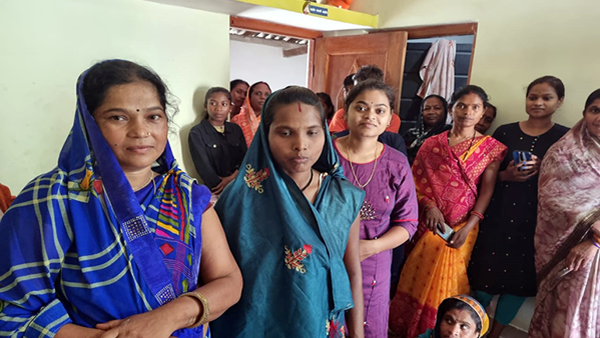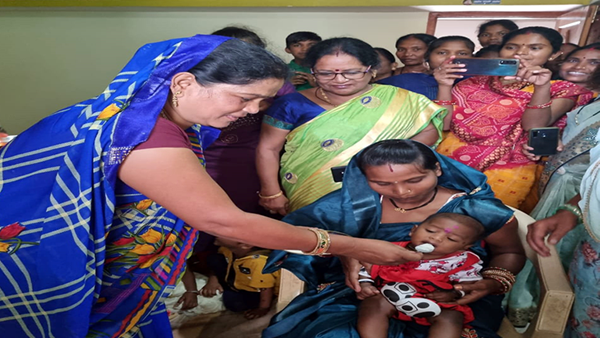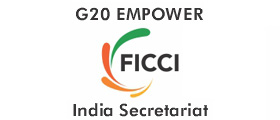It is `Pitrapaksh’[1] and Lakshmi Das Manikpuri’s house in Anjani village of Kanker is buzzing with various activities to mark the first death anniversary of her husband.
Neighbourhood women have gathered in Lakshmi’s house. Some are busy cooking for the occasion, while others are busy making arrangements for the guests that would soon arrive. This year `Pitrapaksh’ coincided with the Rashtriya Poshan Maah (National Nutrition Month) and the district administration has quite innovatively used the occasion of the death anniversary of Lakshmi’s husband to create awareness among the villagers on the correct nutrition for pregnant and lactating mothers, as well as infants and children.
The district administration in September last year, made it mandatory to feed children, pregnant and lactating women, at all functions and occasions - be it weddings, engagements, birthdays, religious functions, even death anniversaries – to bring down the levels of malnutrition in the district.
This special nutrition initiative in Kanker, called ‘Suposhan Bhoj” (Nutritious feast) was driven by the District Collector, Dr Priyanka Shukla, a doctor, who led the National Health Mission in Chhattisgarh before moving to Kanker.
“Anemia is a major problem in Chhattisgarh and I believe strongly that only a community-led initiative is sustainable,” says Dr. Shukla.
Kanker, often referred to as the Gateway to Bastar, has 6,822 moderately malnourished children in the age group of 0-5 years, accounting for 13 per cent, and 916 severely malnourished children in the same age group, accounting for 1.83 per cent of the total number of children in the region.
The initiative is an attempt to involve the community in reducing malnutrition. “The idea is to ensure that children, particularly malnourished children, get to eat as much nutritious food as they can. Several meals a day would be an ideal thing for under-nourished children,” she says. “There is hardly a day in the village when the communities are not coming together for a collective observance of one kind or another. Feeding children on such occasions is a good way to supplement their nourishment."
The district administration has held several awareness campaigns to make people understand the importance of Suposhan Bhoj. Mitanins[2] and Anganwadi[3] workers have been asked to ensure that every `bhoj’ is documented. So far, as many as 1,186 malnourished children participated in the `Suposhan Bhoj’ organised in 522 households of eight blocks of the district during Rashtriya Suposhan Maah (National Nutrition Month). Around 105 children made it out of the malnourished category within just one month. Antagarh and Durgukondal blocks saw 24 children making it out of the malnutrition category, followed by Kanker and Bhanupratappur that saw 13 malnourished children joining the ‘well-nourished’ category within one month.
“Indians always have had a tradition of inviting people for meals to mark important days,” says Tribhuvan Singh Dhruv, Project Officer, Integrated Child Development Services[4]. “We have just narrowed the focus on children and expectant or new mothers with the aim to make the district malnutrition free."
[2] Mitanin in Chhattisgarhi means friend – a female friend. In most parts of this state there exists a traditional custom that a girl of one family is bonded to a girl of another family through a simple but enchanting ritual ceremony and from that time onwards they become Mitanins to each other. According to custom any girl can always count on her Mitanin in times of need. It is this custom that was built on – to create a new type of Mitanin – the Swasthya Mitanin – the friend of the village for health care needs.
[3] Anganwadi centres are community health centres that provide basic healthcare especially to children, new or expecting mothers. It is a part of the Indian public health-care system.
[4] Integrated Child Development Services is a government program in India which provides nutritional meals, preschool education, primary healthcare, immunization, health check-up and referral services to children under 6 years of age and their mothers.
 |
 |
These stories of women-led development have been compiled by UN Women India. All copyrights to the stories and images are held by UN Women India Country Office dated December 2022. |

